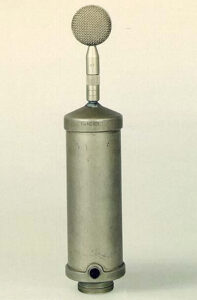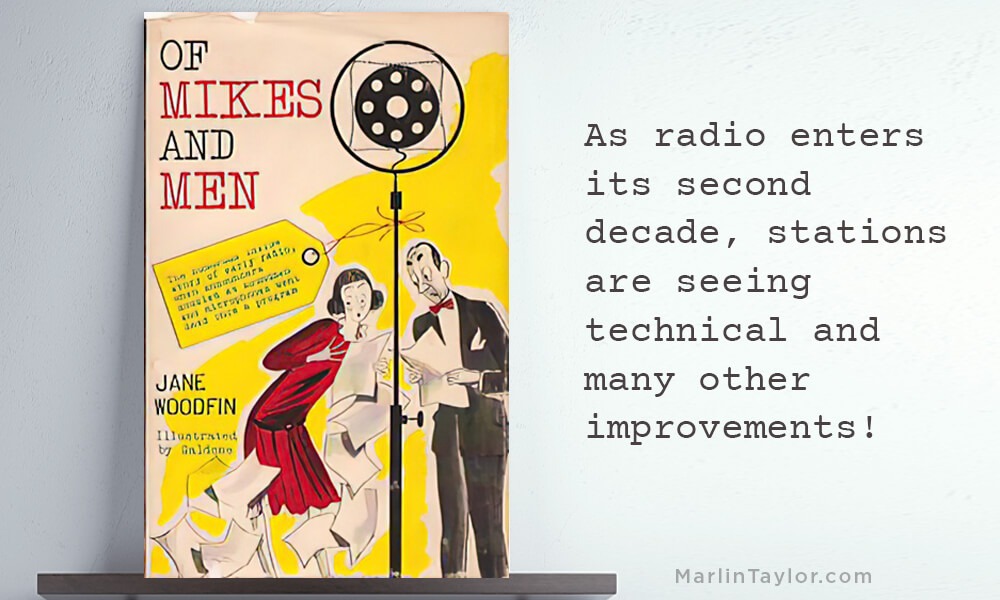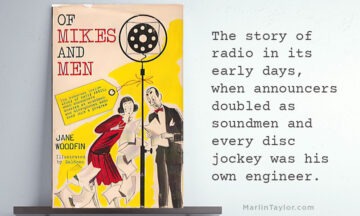A year ago, I shared with you a small portion of this book, which was published in 1951. The story takes place at the very end of the 1920’s when, somewhere it was described that, radio was still in its “diaper days.”
If you have not read Part One of this tale (officially called “a novel” to protect the guilty) I suggest you read Part One first. In there you learn about the author — Miss Woodfin — being hired as a continuity writer. Her tasks included being the writer and host of a daily women’s program, the Better Homes Girl of the Golden West Network, where she would offer recipes to brighten things up at the dinner table.
The next ten pages covers a number of subsequent weeks, during which letters from listeners have been flowing in regarding the program … with all proving to be so negative, the station’s manager cancels the show.
So, at this point, we are at the beginning of Chapter 3, where signs of change are in the air:
Keep in mind as you read that the new ownership and management has big goals. However, this was still the late 1920s and the Great Depression lay just ahead. Most of the nation’s radio stations still were not operating full-time ( “full-time” meaning 18-hours or more a day, seven days a week). Most stations produced their own programming and much of the music aired was performed live — the use of phonograph records was not yet extensive.
One of the first things I heard when I came to KUKU was certain raised-eyebrow, sepulchral-toned discussions of they! They were going to salvage the wreckage! They were going to do this! They wouldn’t like that! I heard about them from the announcer, Roland Bean, and from Miss Millikin, and from the technician who came up from the basement transmitter once a week to collect his check and pick up his advertising loot, and from Jack Woolen himself. They might appear any day, and when they did, things would happen.
“But who the hell are they, anyway?” demanded Barry one evening when I was entertaining him with tidbits of station gossip.
“I’m not exactly sure. I think they’re the higher-ups, in Seattle. They own our station and one up there, too. And whenever they say something, it seems to be pretty important.”
“Brass hats,” Barry decided wisely. “Well, just remember you’re dangerous as long as you’re swinging.”
I remembered his advice the morning when I came to the station and noticed a crowd in Jack Woolen’s cubicle. The office was so small that two persons filled it to capacity, and this time there were four packed within its narrow confines. No one volunteered me a shoehorn and an invitation to join them, so I went on back to my desk and found Miss Millikin, suspiciously pink around the eyes, cleaning out her desk drawer.
“If those are clients in Jack’s office,” I began brightly, “I hope it’s a fur account. I haven’t a decent coat, and the weather’s turned colder.”
She shushed me with a glance, and bending over as though to extract hand lotion, aspirin, adhesive tape, and a quart of sewing machine oil she had received on her last week’s salary, she spoke without opening her lips.
“They’ve come,” I finally made out. “They’re firing everybody. They just gave me my check, and now they’re giving Jack his. You’ll be next.”
The first thing that flashed through my mind was the Elixir of Youth reducing pills that Jack had forced upon me as part of last week’s salary. The Elixir of Youth was a new account, and one for which I had written glowing, adjective-abounding copy, but when I had tried to turn those pills into cash at various drugstores, I had been told that no reputable druggist would handle them.
Meanwhile, back to the office and the activity of the moment . . .
Miss Millikin looked at me reproachfully as she continued with her packing, but I ignored her, throwing myself into spots and introductions without even a momentary wait for the right word. Sheets of copy piled up in my basket, and with each addition I got just a little bit madder. At the rate I was going I’d have eight hours’ work completed in two.
Roland Bean came briskly from the control room, a sheet of paper in his hands. Presumably it was to consult me about some copy, but I knew Roland. He was after news.
“Have they talked to you yet?” he hissed, leaning over and waving the paper under my nose.
“No,” I said stiffly, pushing him away.
“They will,” he predicted grimly, annoyed that I wouldn’t cooperate. “I just got two weeks’ notice, and I’ve got to work it out. That’s the breaks they always give me. With that extra check right now I could make it to San Francisco on the bus. The only reason I’m not on a San Francisco network now is that I’ve never had a break. You couldn’t get one around this cheap joint. I’m glad to shake the dust from my feet.”
I continued typing and pretty soon he gave up and went back.
An hour went by and then two. Jack Woolen and Miss Millikin left, while they held down the cubicle. Roland kept on grinding records and reading spots, and I kept on turning them out.
Then I was aware that someone was standing by my desk. He was a diminutive man in tweeds, with shoulders padded in the best manner of an Atlas ad. His thin neck rising out of his collar and his bony hands emerging from his sleeves gave the lie to that muscular development, but the tweeds were obviously so expensive, as were his handmade shoes and scarlet cravat, that no one around KUKU would challenge him.
“Miss Woodfin?” he asked, looking me over appraisingly. “I’m Chet Minsinger. Mr. Zerhorst would like to see you.”
And, shortly, we’re about to learn (clarifying my final words in Part One) that the Crash being referenced here was related directly to the Golden West Network going broke and being sold, occurring only a few weeks prior to The Crash of Wall Street and the stock market and the beginning of the Depression, which came the last week of October 1929.
From a radio history standpoint, the station is KEX in Portland and Mr. Zerhorst is one Ralph A. Horr, who had taken control of the company, now named the Northwest Broadcasting Company and also owning KJR Seattle and KGA in Spokane. As an aside, all three of these stations still carry their original call letters here in 2022, more than 90 years later.
Returning to the story as being told by Miss Woodfin …
The third man of the trio had departed, and in the swivel chair sat a cold-eyed individual with a mouth that closed like a coffin lid and as efficiently ended the subject. He was different shades of gray — hair, eyes, and clothes — but some of it could have been an illusion of the cigar smoke which filled the cubicle like sea fog and to which both Mr. Minsinger and Mr. Zerhorst appeared bent on adding as rapidly as possible.
“This is Miss Woodfin, the continuity writer,” said Mr. Minsinger, removing his cigar.
“Sit down, Miss Woodfin,” said Mr. Zerhorst, not removing his.
“How long have you been at KUKU?”
“About two months,” I admitted, trying to hold my breath so I wouldn’t choke.
“You came after The Crash?”
“Yes, sir.”
The Crash, to which we always referred in capital letters, meant the recent bankruptcy proceedings of the Golden West Network. The financial condition of the country at large was small in our minds by comparison.
“What salary do you get?”
“Twenty-five a week. Ten of it in cash.”
“It will all be in cash from now on,” frowned Mr. Zerhorst, puffing even harder. “No more damn merchandise. KUKU’s going to make a comeback. Going to grow. It’s going to be the best damn radio station in this damn town. Chet Minsinger’s your new manager.”
“You mean I’m to stay?” I gasped, forgetting and inhaling naturally. It was a mistake and I paid for it with a coughing spell, but doubtless both men thought it was caused by my intense emotion.
“Certainly you’re going to stay,” smiled Mr. Minsinger smoothly. “We’re going to rebuild the studio and have a whole new staff. Good efficient people. The right kind of people. Just one big happy family.”
Mr. Zerhorst had lapsed into a thoughtful contemplation of the tobacco fog, and Mr. Minsinger silently signaled that my interview was at an end and that I could return to work.
As we read on, Mr. Zerhorst’s statement to Miss Woodfin were quickly evident …
***
By the next morning a definite change had taken place. It was apparent even before one opened the glass door labeled KUKU, for the lobby was not soundproof, and the noises of ripping partitions and of hammering and sawing were lusty and continuous.
Mr. Zerhorst, in the best tradition of they, was no longer with us. That was one of the most effective measures they used for creating awe among staff members. They, like the Wizard of Oz, emerged rarely and briefly from behind a screen, chopped off a few heads, laid down a few ultimatums, and were gone.
Yet two members of this higher circle remained among us, which marked this situation as a serious one indeed. A third man was there that morning, and with him was a crew of workmen, obviously determined to wreck the place before they rebuilt from the rubble. He was never introduced to me, nor did we ever exchange more than a shy glance, but he was the chief engineer of the Golden West Network, and the work he managed to get out of his hirelings not only was incredible but, to my knowledge, has never been duplicated.
Overnight we had taken space formerly occupied by adjoining offices, and now, instead of one studio, we were to have two. The monk’s cloth draperies that supposedly had deadened sound had been taken down and sent out for their first cleaning, the rugs ripped up from the floor for the same purpose. Broadcasting was temporarily done from the control room.
The offices were also being enlarged, and most amazing of all, the requiem was knolling for my old enemy, the carbon mike. We were to have condensers — long, thin, tubular objects — which were attached by heavy cables to plugs in the wall.

Condenser mikes were the very latest thing, Roland Bean informed me a little enviously, for now that he was to use ours for so short a time he was beginning to be a bit squeamish about his chances for a California audition. They did not have to be coddled at night in an electric oven. Shaking them during a broadcast was unnecessary. Nor did they snarl back at you and whine in the middle of a program.
To add to this confusion, there began that morning a constant procession of strange and assorted individuals who had answered Chet Minsinger’s advertised plea for a staff. They were of both sexes and all ages, some hopefully carrying musical instruments, although it had been definitely stated that only an office force would be hired at the start.
Chet, however, saw them all, and if the young and more pulchritudinous females basked a little longer in the fumes of his cigar, who was to criticize? I had learned the first day they arrived that Mr. Minsinger’s wolfish instincts were adequately muzzled.
Historically, it was just two years earlier that the first national radio programming network — the National Broadcasting Company — had begun offering a few hours of programming each day, and transmission lines had not yet reached the West Coast. Regarding KUKU/KEX, it had been only a year since the station has begun receiving some of its programming from the “mother station,” KJR in Seattle.
Back for one more paragraph from Miss Woodfin’s sharing of how life was in a radio station circa 90-plus years ago, the first decade in the history of radio broadcasting …
By the end of the week we had a full staff. There was a hostess, a petite blonde named Vi Weathering, who answered phones, handled the public who came to gape through our new glass windows, sorted mail, and took Chet’s dictation with speed and wisecracks. There was a new bookkeeper, imported from Seattle and named Miss Tolman, who kept entirely to herself behind inch-thick glasses. She handled all communications between us and the head office. There were three new announcers, who for the first time in radio were not expected to handle their own controls as well as announce. To twist dials and modulate voices we now had two new technicians who did nothing else. There were also two full-time salesmen, whose mission it was to extol the virtues of KUKU as an advertising medium to prospective sponsors. We were, as Chet Minsinger had promised, just one big happy family.
And, my friends, the “revived and improved” KUKU is off and running.
With that, I can tell you that if you have a desire to read all of the book’s 246 pages, it can now be found at World Radio History. If you wish to pick up where I just left off, go to Page 35. However, if you care to read about Chet Minsinger and his darling wife Zaza, scroll back a couple of pages.
Finally … as I’ve said before — let me hear from you, your thoughts, comments about radio back then and today. What about the fact that today, so much of radio’s content is not, as decried by many, “live and local” … compared to when you hark back to the earliest days, it was virtually — for better or worse — mostly all “live and local!”



